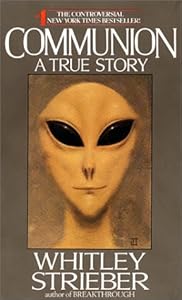 I finally picked up Author Whitley Strieber’s ‘Communion’, and could not put it down. I’ve walked by the book dozens of times in bookstores, at airports, and have seen the dark glossy eyes on the cover peering deep within me, almost hauntingly, to the point where I was somewhat afraid of the read. I must say that I am glad I got past this, and it may very well be some twist of fate that brought about the read at this particular time.
I finally picked up Author Whitley Strieber’s ‘Communion’, and could not put it down. I’ve walked by the book dozens of times in bookstores, at airports, and have seen the dark glossy eyes on the cover peering deep within me, almost hauntingly, to the point where I was somewhat afraid of the read. I must say that I am glad I got past this, and it may very well be some twist of fate that brought about the read at this particular time.
 Strieber discusses, in bitter detail, his lifelong encounters with being taken – and further having interactions with what he perceives to be extra terrestrials. While he relays two specific gripping and harrowing accounts, the remainder of the work reflects his inner peace found with the experience and his new perception of life in the aftermath of these events. Strieber’s description and self-investigation of his experiences are so deep that it would be difficult to question his sanity – he is clearly a brilliant person who has simply found peace with what he arrives at being a fortunate set of unique experiences.
Strieber discusses, in bitter detail, his lifelong encounters with being taken – and further having interactions with what he perceives to be extra terrestrials. While he relays two specific gripping and harrowing accounts, the remainder of the work reflects his inner peace found with the experience and his new perception of life in the aftermath of these events. Strieber’s description and self-investigation of his experiences are so deep that it would be difficult to question his sanity – he is clearly a brilliant person who has simply found peace with what he arrives at being a fortunate set of unique experiences.Two items in particular jumped out at me that warrant some discussion. First is Strieber’s mention that his visitor may have been in the form of Ishtar – the Babylonion goddess of fertility most popularly associated with the Epic of Gilgamesh.
This particularly struck me as my recent investigations of the ancients and roots of advanced human civilization make continued reference to intervention of ‘the gods’, with Ishtar being among them. Why would this individual reoccur, and with a similar ‘divine’ intervening approach? As I’ve considered mythology in context with the development of civilization, it seems far fetched to believe that all people on Earth found themselves in some hallucinogenic state to create stories and go through the effort of recording them (often laboriously in stone) to be passed on as just that – stories. Clearly, the events occurring at the start of civilization had profound impacts on the people of the time. A ‘visit’ from Ishtar would certainly be influential enough to share with future generations.
Second, towards the end of the text, Strieber relays a statement that “the stakes are high: Mankind is in the position of maturing as a species at the same time that our planet could be dying.” No truer words can be said of our current times. While we strive for advancement in every conceivable way, much of this is in the framework of increased knowledge of the material plane. We have not bettered ourselves, rather just continue to strive to make life more and more efficient. With that comes orders of magnitude of increasing social and political complexities, and our fundamental relationship with planet Earth is lost. This shows in so many ways, as evidenced by rapid climate change, extensive habitat and species loss, and natural resource depletion. The ancients on the other hand, had a deep synergy with the environment, as their priority was spiritual or conscious advancement. They found a connectivity with ‘something else’ that offered a sense of fulfillment. Of course, as we understand history, this was not sustainable as all of these cultures have long since vanished. Perhaps this course of evolution, influenced by ‘the gods’, was threatening, so was forced to destruction.
In any event, ‘Communion’ is a must read. For believers and non-believers alike, the book encourages us to keep an open mind to personal perception of the world around us (and beyond) and promotes a manner of thinking that makes the world a much bigger (and more exciting) place than we know it to be.
Related articles
- Open Letter On Scientific Evidence for Extraterrestrial Implants (revolutionizingawareness.com)
- 10 Real Life “Memoirs” That Read Like Scifi and Fantasy Stories [Daily 10] (io9.com)
- The Nye Incidents Finds a Writer (dreadcentral.com)


